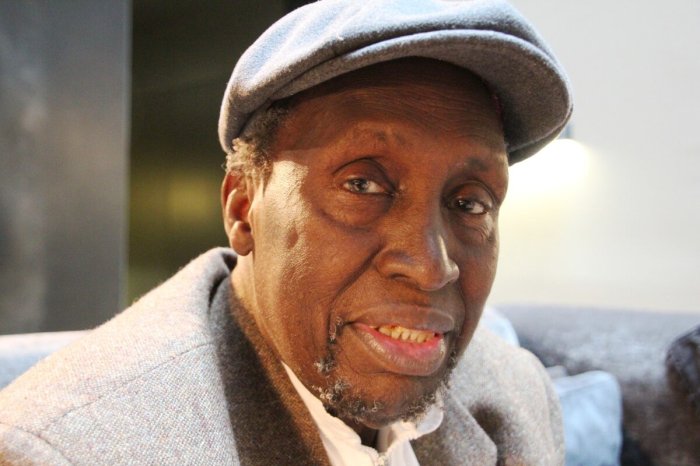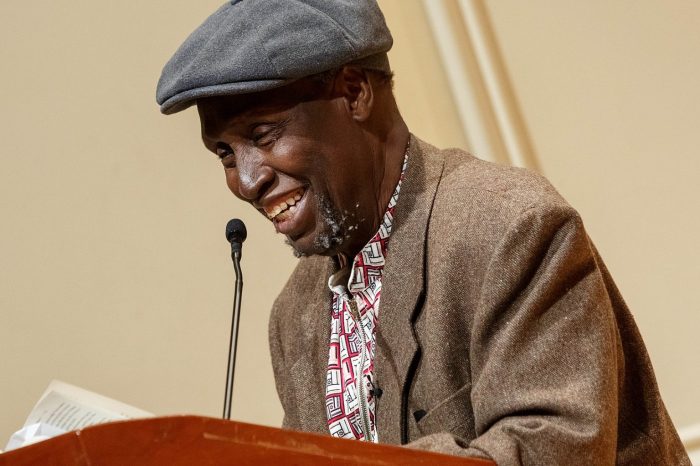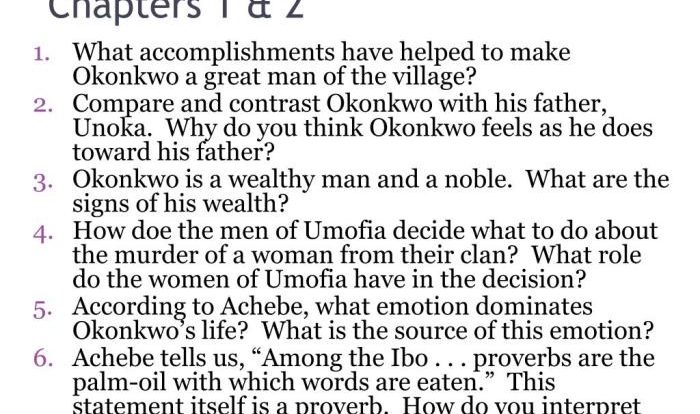The return ngugi wa thiong’o summary – The Return: A Comprehensive Summary of Ngugi wa Thiong’o’s Masterpiece provides a thorough overview of this seminal work of African literature, exploring its intricate plot, compelling characters, and profound themes.
Ngugi wa Thiong’o’s The Return is a powerful and moving novel that delves into the complexities of postcolonial Africa, examining issues of identity, alienation, and the struggle for independence.
Summary of Ngugi wa Thiong’o’s “The Return”

Ngugi wa Thiong’o’s novel “The Return” tells the story of Waiyaki, a Kenyan writer who returns to his homeland after many years of exile. Waiyaki’s return coincides with a period of political unrest in Kenya, and he soon finds himself caught up in the struggle for independence.
The novel explores the themes of colonialism, neocolonialism, and the search for identity. Waiyaki’s journey is a metaphor for the journey of the African people as they struggle to free themselves from the legacy of colonialism and find their own place in the world.
The Return’s Significance in African Literature
“The Return” is a seminal work in African literature. It is one of the first novels to explore the experiences of Africans in the post-colonial era. The novel’s realistic portrayal of the challenges facing African nations and its exploration of the complex relationship between tradition and modernity have made it a classic of African literature.
The novel has also been praised for its innovative use of language. Thiong’o writes in a blend of English and Gikuyu, the language of his childhood. This use of language reflects the novel’s exploration of the complex relationship between tradition and modernity.
Character Analysis
Ngugi wa Thiong’o’s “The Return” delves into the intricate lives of its characters, exploring their motivations, development, and the profound influence of family and community on their identities.
Kamiti
Kamiti, the protagonist, returns to his village after nine years of political imprisonment. Haunted by the horrors he witnessed, he struggles to reconcile with his past and find a place in a community that has moved on without him.
- Motivation:Driven by a longing for redemption and a desire to reconnect with his roots, Kamiti returns home to confront his past and seek reconciliation.
- Development:Initially withdrawn and haunted by his experiences, Kamiti gradually re-engages with his community and finds solace in the love and support of his family. However, his scars run deep, and he remains an outsider, unable to fully escape the trauma of his past.
- Family and Community:Kamiti’s family provides him with a sense of belonging and acceptance, offering him a sanctuary from the judgment and hostility he faces from others. The community, however, remains divided, with some welcoming his return while others view him with suspicion.
Wariinga
Kamiti’s wife, Wariinga, has raised their children alone during his absence. Strong-willed and resilient, she has faced adversity with determination and has become a pillar of strength for her family.
- Motivation:Driven by love and loyalty, Wariinga remains steadfast in her support of Kamiti, despite the challenges and hardships she has endured in his absence.
- Development:Wariinga’s character undergoes subtle but significant growth throughout the novel. Initially portrayed as a supportive and patient wife, she gradually emerges as a powerful and independent woman, capable of standing up for her beliefs and challenging societal norms.
- Family and Community:Wariinga’s unwavering commitment to her family and her role as a mother shape her identity. She finds strength and purpose in nurturing her children and providing them with a stable and loving home.
Historical Context
Ngugi wa Thiong’o’s “The Return” is set against the backdrop of Kenya’s tumultuous post-independence period. This era was characterized by political instability, social upheaval, and the struggle for national identity.
Kenya gained independence from British colonial rule in 1963. However, the transition to self-governance was not smooth. The country faced a series of challenges, including ethnic tensions, economic inequality, and authoritarian rule.
Political Instability
After independence, Kenya was plagued by political instability. The country experienced several coups and attempted coups. In 1978, President Jomo Kenyatta died and was succeeded by Daniel arap Moi. Moi’s rule was marked by repression and human rights abuses.
Social Upheaval
The political instability in Kenya led to social upheaval. The country experienced widespread poverty, unemployment, and crime. There were also a number of ethnic clashes, particularly between the Kikuyu and Luo communities.
The Struggle for National Identity
The post-independence period in Kenya was also a time of struggle for national identity. The country was divided along ethnic and regional lines. There was also a debate about the role of traditional culture in a modernizing society.
Literary Devices

Ngugi wa Thiong’o’s “The Return” employs various literary devices to enhance its narrative impact and convey deeper meanings. These devices include symbolism, imagery, and foreshadowing, each contributing to the novel’s exploration of themes and characters.
Symbolism
Symbolism is a literary device where objects, characters, or events represent abstract ideas or concepts. In “The Return,” the railway symbolizes the journey of the protagonist, Waiyaki, as he navigates personal and political transformations. The railway tracks represent his path through life, while the train journey itself signifies his progress and development.
Imagery
Imagery involves the use of vivid language to create sensory experiences for the reader. Ngugi wa Thiong’o uses imagery to evoke the harsh realities of colonial oppression and the struggles of the Kenyan people. The descriptions of the detention camp, the torture scenes, and the violence against the protesters create a visceral and emotionally charged experience for the reader.
Foreshadowing
Foreshadowing is a literary technique that hints at events or developments that will occur later in the story. In “The Return,” the author uses foreshadowing to create a sense of anticipation and suspense. The mention of the “thing” that Waiyaki must do before he can return home foreshadows the violent uprising and his role in it.
Similarly, the recurring image of the vultures foreshadows the impending bloodshed and death.
Themes

Ngugi wa Thiong’o’s “The Return” explores a complex tapestry of themes, offering a profound examination of the human condition in the aftermath of colonialism.
Identity, The return ngugi wa thiong’o summary
The novel delves into the intricate nature of identity, particularly in the context of a postcolonial society. Protagonist Waiyaki’s journey is marked by a constant search for his true self, grappling with the complexities of his hybrid cultural heritage.
- Waiyaki’s struggle to reconcile his Western education with his African roots.
- The clash between traditional values and the influence of modernity.
- The complexities of belonging and alienation within a rapidly changing society.
Alienation
The novel portrays the pervasive sense of alienation that permeates postcolonial Africa. Characters find themselves disconnected from their communities, their history, and their own sense of purpose.
- Waiyaki’s estrangement from his village and his family.
- The isolation and loneliness experienced by characters who have been marginalized by society.
- The alienation of individuals from their cultural traditions and spiritual beliefs.
Struggle for Independence
“The Return” is deeply rooted in the historical context of Kenya’s struggle for independence from British colonial rule. The novel explores the complexities of this struggle, highlighting the sacrifices and challenges faced by those who fought for liberation.
- The portrayal of the Mau Mau uprising and its impact on Kenyan society.
- The role of the intelligentsia in the fight for independence.
- The challenges of nation-building in the post-independence era.
Critical Reception: The Return Ngugi Wa Thiong’o Summary
Ngugi wa Thiong’o’s “The Return” has received critical acclaim for its literary prowess and profound exploration of socio-political issues. Critics lauded its unique narrative style, powerful characterization, and incisive social commentary.
Novel’s Impact on Literary Criticism
The novel’s innovative use of language and literary devices challenged established literary norms and expanded the boundaries of African literature. It inspired critical reevaluations of traditional literary conventions and sparked debates about the role of literature in social transformation.
Influence on Contemporary African Literature
“The Return” has significantly influenced contemporary African literature, inspiring a generation of writers to explore themes of identity, history, and social justice. Its depiction of rural life, cultural traditions, and the struggles of ordinary people has resonated with readers across the continent and beyond, shaping the trajectory of African literature.
Query Resolution
What is the main theme of The Return?
The main theme of The Return is the struggle for independence, both on a personal and national level.
How does Ngugi wa Thiong’o use symbolism in The Return?
Ngugi wa Thiong’o uses symbolism throughout The Return to explore complex themes and ideas. For example, the river represents the flow of time and the journey of life.
